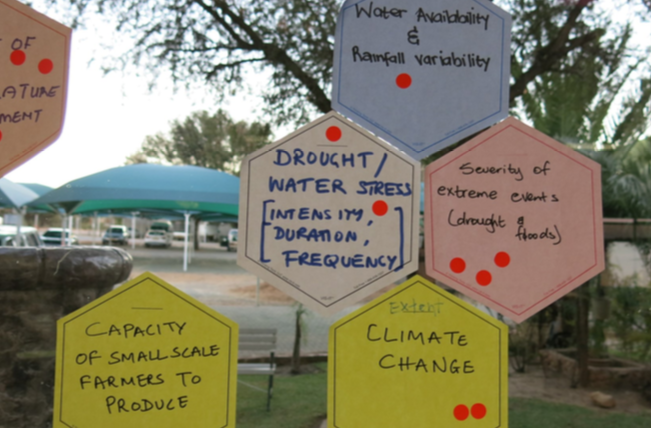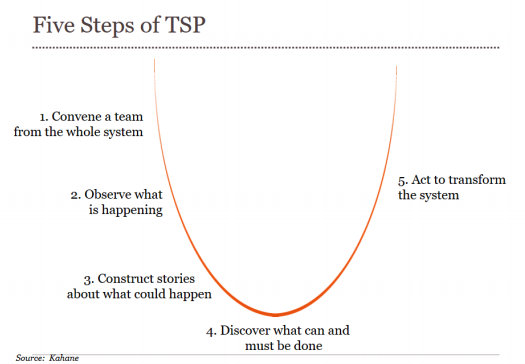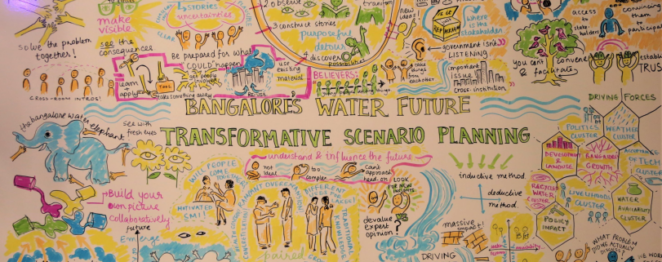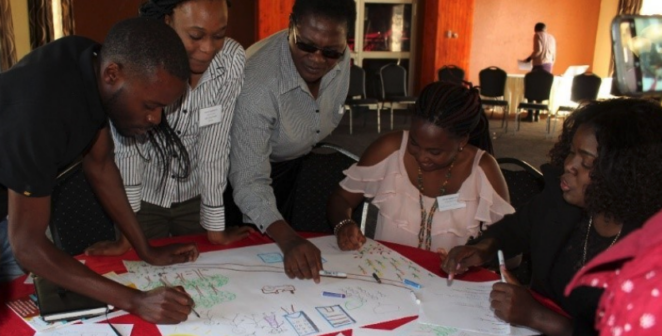Spotlight on Transformative Scenario Planning

Introduction
Through the development of possible stories, the Transformative Scenario Planning (TSP) process (developed by Reos Partners) enables multiple and diverse stakeholders to construct a shared understanding of a critical issue that affects them all, and then to act on the basis of this understanding.
This Spotlight* highlights the successes and challenges of a series of TSP workshops held by ASSAR in five countries.
*Download the full Spotlight from the right-hand column.

Key messages from the case studies
This Spotlight contains a number of case studies where TSP has been applied. Below is a brief overview of the main findings of each case study. See the full text for much more detail.
- Adapting TSP for the ASSAR context (Karen Goldberg): The TSP workshops helped stakeholders to question their current understanding of problems and their role in being part of solutions. Shifts in thinking concerned a heightened awareness of the need to build trusting relationships in order to be more open to doing things differently.
- Workshops can challenge stereotypes and change perceptions (Teresa Perez):
- An unintended consequence of TSP is that it entrenches the existing power of gatekeepers, by relying on people in positions of influence rather than seeking out the involvement of ‘hard to reach’ populations.
- By questioning why we do things the way we do, individuals were made to reflect on their existing assumptions about planning, decision making, and their place in the social system.
- Attempting to transform the future – reflections from the TSP process in Bangalore (Prathigna Poonacha): The TSP process is only the beginning of what needs to be a long and deep engagement on the issue of water in Bangalore. All stakeholders need to be on board, if we are to realise a desirable, sustainable and liveable future for the city.
- WOTR’s experience of organising and facilitating the TSP process in Jalna (TSP facilitation team)
- For our facilitation team, it was very exciting to organise and facilitate a TSP process in a local language for the first time.
- There was a lot of engagement and openness to learn and contribute during the process. There was a willingness to listen to one another and make modifications to our facilitation as appropriate.
- Deciding the future of agriculture in Upper West: the case of Transformative Scenario Planning in Ghana (Prince Ansah and Rahinatu S. Alare): The TSP process provided a good platform for stakeholders involved in climate change adaptation and agriculture to discuss the future of agriculture in the face of harsh climatic conditions.
- Pathways for adaptive change: Insight from scenario outcomes in Mali (Edmond Totin, Amadou Sidibe and Mary Thompson-Hall)
- We ran two TSP workshops n Koutiala District, one of the climatically stressed regions of Mali, to enable people to anticipate plausible future challenges and accordingly design better-informed interventions.
- The TSP process brought together stakeholders with different expertise, knowledge and values across national and subnational levels.
- Using TSP to think differently about the future of land use in Bobirwa, Botswana (Julia Davies)
- Whilst human-wildlife conflict and optimal land utilisation do not fit neatly into any of ASSAR’s research themes, it was evident that these issues were of pressing concern to local communities in the Bobirwa Sub-District.
- With this in mind, the ASSAR team and Reos Partners, along with the local stakeholders, agreed that we would use the TSP methodology to address these concerns, albeit with an understanding of the broader STEEP (Social, Technological, Environmental, Economic and Political) context within which these issues playout.
- Imagining the future of water for productive use in Namibia’s Omusati Region (Cecil Togarepi): TSP enables people to work together on an equal footing with no levels of hierarchy, and opens an avenue of accepting everyone’s point of view.
Further reading
- What is Transformative Scenario Planning?
- Using Transformative Scenario Planning to think critically about the future of water for productive use in Omusati, Namibia
- Transformative Scenario Planning in Bobirwa Sub-District, Botswana
- Preparing for Transformative Scenario Planning (TSP) in India
- Using Transformative Scenario Planning to think critically about the future of agriculture and food security in Ghana
- The ASSAR Spotlight – November 2015 Edition
- The ASSAR Spotlight – July 2016 Edition
- ASSAR Regional Diagnostic Studies
- Use and Communication of Climate Information to Support Uptake of Adaptation Action in the Semi-Arid Regions of Africa and Asia: ASSAR report
- Climate Change Scenario Primer


(0) Comments
There is no content